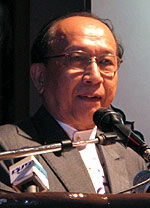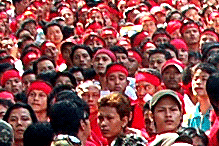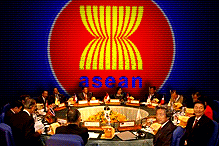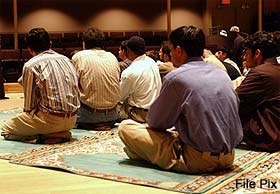Even with his years of political experience and decent academic credentials, Foreign Affairs Minister Rais Yatim never seems to notice the speck in his eye when he suggests others have the beam in theirs.
Yesterday at Parliament House, he told the press that he was mulling several options in regard to the human rights situation in Burma, especially the problems confronting Aung San Suu Kyi, the opposition figurehead and a Nobel laureate.
 “It is incumbent on us to instill in Asean officials the awareness that the regional grouping adheres to human rights, particularly the fundamental provisions set out in the Universal Declaration of Human Rights,” he said.
“It is incumbent on us to instill in Asean officials the awareness that the regional grouping adheres to human rights, particularly the fundamental provisions set out in the Universal Declaration of Human Rights,” he said.
What about Malaysia’s state of human rights?
“It is congenially acceptable.”
Rais was clearly unfazed. I wonder if he had Raja Petra Kamarudin and all other Internal Security Act detainees in mind when he was commenting on human rights issues at home and abroad.
Perhaps some of the journalists should have reminded him that the Hindu Rights Action Force had just been declared an “illegal” group even though its members had merely exercised the right to assemble and to protest in a peaceful manner.
If Utusan Malaysia is permitted to run articles and stories tinged with racist undertones and innuendo, why are others denied the space to air their legitimate grouses and concerns?
 It is indeed beyond me that Rais would like to see the human rights in Burma improved while he and his cabinet colleagues have been doing nothing to safefuard and enhance the livelihood of
Burmese nationals
of various ethnic origins who are already in our midst.
It is indeed beyond me that Rais would like to see the human rights in Burma improved while he and his cabinet colleagues have been doing nothing to safefuard and enhance the livelihood of
Burmese nationals
of various ethnic origins who are already in our midst.
It is also incredulous to witness the utter indifference on the part of the Burmese military junta towards the human rights abuse against its citizens in the neighbouring countries, which is sufficiently indicative of the nature of an authoritarian regime.
Under Umno, Malaysia has gone to great lengths to make its presence felt regionally and internationally, but also selectively (sheltering the Bosnian Muslims but turning a blind eye to the anti-Chinese riots in Indonesia in the 1990s for instance). However, not all its efforts have been appreciated by others.
Resolving Mindanao’s conflicts
For years, our government has been involved in the peace talks between Manila and the Moro Islamic Liberation Front (MILF) based in southern Philippines. This week, there have been calls in the Philippine Senate to replace Malaysia as third-country facilitator due to territorial disputes over Sabah and the Spratly Islands.
 One core reason why inter-regional solidarity and cooperation have their limits in Asean is because of the twin threats of separatism and irredentism. Hence, the concern raised by Filipino senators over Malaysia’s “vested interests” in southern Philippines is perfectly understandable.
One core reason why inter-regional solidarity and cooperation have their limits in Asean is because of the twin threats of separatism and irredentism. Hence, the concern raised by Filipino senators over Malaysia’s “vested interests” in southern Philippines is perfectly understandable.
In fact, there is even speculation that the drafted Memorandum of Agreement on Ancestral Domain (MOA-AD) between Manila and the MILF guerillas was part of the outcome of the behind-the-scenes manoeuvring by the US.
The MOA-AD was widely seen as a compromise on Manila’s jurisdiction over Mindanao, and the signing ceremony was to have taken place in Putrajaya in August. It was put on hold and the Philippine Supreme Court this week ruled that it is illegal and unconstitutional, effectively rending the deal in a limbo.
It is also a blow to Malaysia’s regional standing.
If signed, the MOA-AD could pave the way for the break-up of Mindanao as the Muslim enclave has sought independent rule from Manila. Likening it to the Balkans in Europe, former senator Franklin Magtunao Drilon claimed that “the stage is being set for a Kosovo in Mindanao”.
To deflect public criticism, Washington clarified that it had no involvement in the drafting of the controversial MOA-AD and denied having meddled in the peace process in southern Philippines.
Still, it does not obscure the fact that the MILF, being among the largest rebel groups in Southeast Asia, has received material support from the US in exchange for uninhibited access to oil fields as well as permanent military presence in the area.
While Kristie Kenney, the US Ambassador to Manila, pointed out that the US Institute of Peace (USIP) acted on its own in preparing a study paper on the peace process that did not reflect Washington’s position, she failed to mention Secretary of Defence Robert Gates as among the members ex-officio of USIP.
The US State Department has been closely involved in southern Philippines, with Eugene Martin, then US envoy and head of the so-called ‘Philippine Facilitation Project’, being a key player.
 There are valid concerns among politicians in Manila as well as Muslim communities in Mindanao that Washington (and KL for that matter) is seeking to exploit the problems in the region to its own advantage, not dissimilar from the exclusive access to the natural resources that the US has gained in Aceh and Papua of Indonesia since 2005.
There are valid concerns among politicians in Manila as well as Muslim communities in Mindanao that Washington (and KL for that matter) is seeking to exploit the problems in the region to its own advantage, not dissimilar from the exclusive access to the natural resources that the US has gained in Aceh and Papua of Indonesia since 2005.
Confronted with the taxing issue of undocumented persons in Sabah, Malaysia is no doubt eager to resolve the conflict in southern Philippine. But it is a challenge that Rais and his team of experts can tackle on their own given the substantive role played by the US.
The same goes for other issues concerning regional countries, including Burma. If the foreign minister indeed has the best interests of Asean nationals at heart, he should perhaps liaise with his cabinet colleagues to first come up with something concrete and long-lasting to help alleviate the plight of Filipinos and Burmese on our soil.

